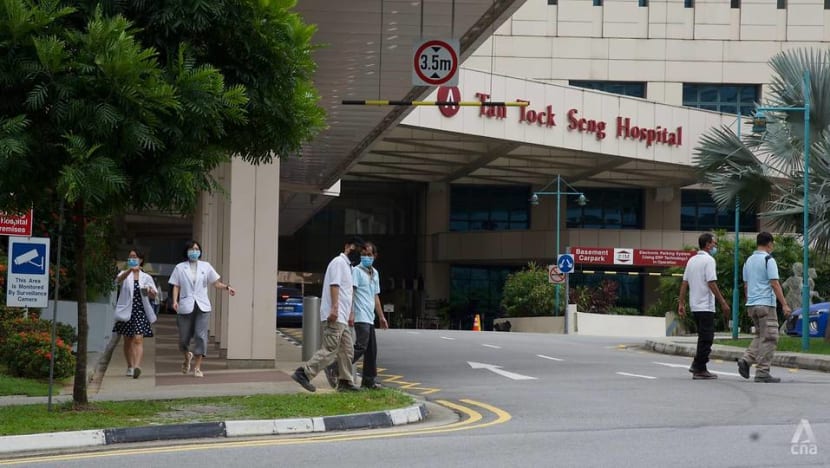Healthcare system remains stable despite high number of COVID-19 cases, says Gan Kim Yong

Staff members and pedestrians are seen outside Tan Tock Seng Hospital in Singapore on Apr 30, 2021. (File photo: Calvin Oh)
SINGAPORE: While daily case numbers are high, the large majority of COVID-19 cases have mild or no symptoms and the healthcare system remains stable, said the Ministry of Health (MOH) on Wednesday (Feb 16).
Over the past week, there was an average of around 11,000 coronavirus daily cases. On Tuesday, the daily caseload shot up to a high of 19,420.
"We are now in the middle of this Omicron wave and are still climbing the epidemic curve. So far, most of the cases continue to be mild, especially for those who are fully vaccinated," said Trade and Industry Minister Gan Kim Yong, who co-chairs the COVID-19 multi-ministry taskforce, at a virtual press conference.
He said that authorities expect daily case numbers of between 15,000 and 20,000 or even higher. Based on the experience of other countries, the number of cases is expected to peak in a few weeks' time before it starts to decline, said Mr Gan.
"Overall, our healthcare system remains stable and has been able to cope with infections," he said.
Health Minister Ong Ye Kung said that 20,000 daily cases is within MOH's expectations and in line with the projections of their scientists.
He said that the number of patients in the intensive care unit (ICU) remain at 20 to 30 people, which is a fraction of the number of ICU beds occupied during the peak of the Delta wave in Singapore.
"Our worst fear, which is the ICU being overwhelmed, thankfully did not happen, and (there is) no sign of that happening," Mr Ong said.
"This is because Omicron is inherently a less severe disease, but also very importantly, our vaccination, our boosters are working."
Currently, there are 23 cases in ICU care, and 140 require oxygen supplementation. In the past 28 days, 0.04 per cent of local cases required ICU care and and 0.3 per cent required oxygen supplementation, said MOH.
The number of cases which are hospitalised is around 1,400, of which about 30 per cent are "incidental cases", that is, the patients were hospitalised due to other illness but were tested to be COVID-19 positive.
Meanwhile, hospitals are increasing bed capacity to care for severe COVID-19 cases, while ensuring that care for non-COVID-19 patients are not compromised, said MOH.
STRESS ON PRIMARY HEALTHCARE SYSTEM
However, Mr Ong warned that there is still stress being felt in the healthcare system, especially at the "front end"- general practitioner clinics, polyclinics and hospital emergency departments.
But a great majority of patients who seek medical care have no symptoms or mild symptoms.
"It is important for us to preserve primary care capacity as well, just as we want to preserve hospital capacity so that care goes to those who need them the most," he said.
On Tuesday, MOH had announced that people who suspect they are infected can go to quick test centres to get themselves tested.
If they are tested positive, they will get an official infection record in the HealthHub app, and their test results can also be used as proof to employers to be excused from work.
Mr Ong urged employers to accept these test results as documentation.
70 CHILDREN UNDER 12 HOSPITALISED
About 70 of hospitalised patients are children under 12 years old, and the infection rates for children below 12 years old are currently high.
For children aged 0 to 4 years, the infection rate is at about 243 per 100,000 population and for those aged 5 to 11, it is 258 per 100,000 population.
Those aged 12 to 19 years have the highest infection rate of about 269 per 100,000 population.
"Aside from standing up more beds for children in our public and private hospitals, we are also actively converting beds in our COVID-19 Treatment Facilities for children and their caregivers," said MOH.
The proportion of severe COVID-19 infections and Multisystem Inflammatory Syndrome in Children associated with COVID-19 cases is around one out of 1,000 paediatric infection cases.
MOH said that vaccination of children will help lower the risk of such episodes.
BOOKMARK THIS: Our comprehensive coverage of the COVID-19 pandemic and its developments
Download our app or subscribe to our Telegram channel for the latest updates on the coronavirus pandemic: https://cna.asia/telegram



















